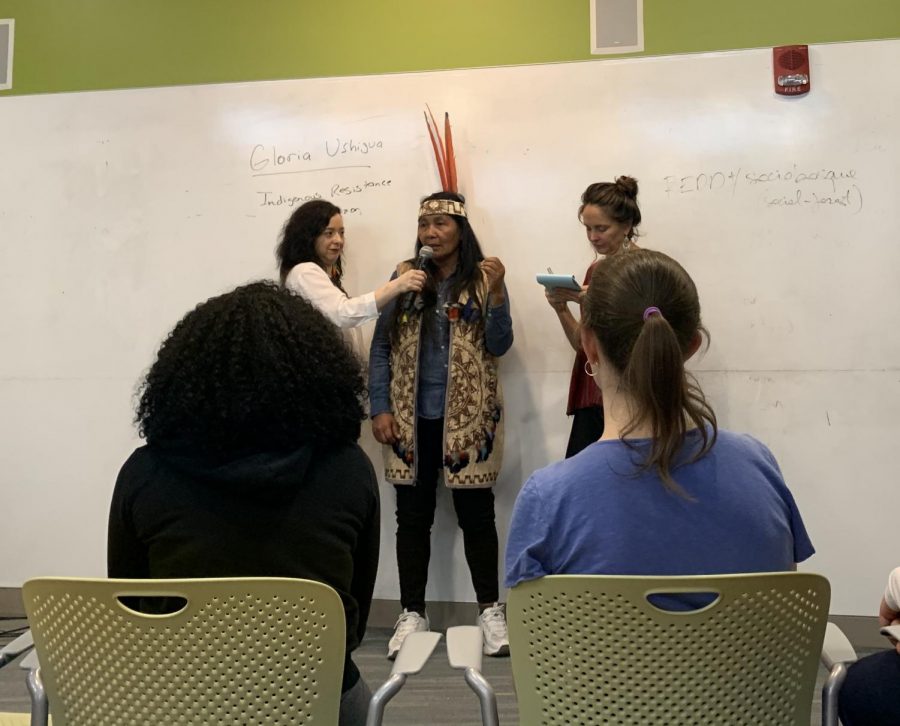On Wednesday, Sept. 25, the University of Massachusetts hosted Gloria Ushigua, leader of the Ashinwaka Sápara Women’s Association, in an event titled “Indigenous Resistance in the Amazon.” The talk was given in Spanish, Ushigua’s second language.
During the event, Ushigua was presented with questions by Angelica Bernal, UMass associate professor of political science, and her responses were interpreted into English by Manuela Picq, a visiting associate professor of political science.
The day’s talk was put on in conjunction with the Sept. 20 to Sept. 27 global climate strikes and was co-sponsored by the UMass Political Science Department, the Amherst College Political Science Department, the UMass Center for Latinx, Caribbean and Latin American Studies and the Five Colleges Native American Indian Studies.
Ushigua, an indigenous leader and defender of human rights from the Sápara territory of Ecuador, spoke about her experience leading the resistance against climate change and the exploitation of her community.
The talk began with a description from Ushigua about her home indigenous territory of Sápara, located in the Pastaza region of the Amazon rainforest.
Speaking about the Spanish occupation of Sápara, Ushigua recalled that “we used to be many and a large nation, but now we [are] very few.” She explained that the Spanish first arrived for the extraction of rubber, and then for growing cotton, using the indigenous people as slave workers.
Despite this, Ushigua stated “we as a people are a light.”
She then moved on to speak about her experience getting involved in advocacy when she noticed the lack of representation that women had in her home territory of Sápara. Through fighting to get Sápara officially recognized as a nation, and organizing the women of the territory, she was able to be recognized as the president of the Sápara territory.
Then Ushigua said, after organizing a march and speaking in New York City at the United Nations, she got the opportunity to travel the world to meet other native people in their own territories.
“I was afraid of talking at first. I didn’t know much about politics … or the language or politics,” she said.
After three years of her travels, she recalled, “I had traveled around and created a network … and understood that indigenous people everywhere had lost their territories.”
“That’s when I stopped fighting with the men in my communities and started fighting with the states,” said Ushigua.
One of the resistances that Ushigua led was to prevent the exploitation of her land from oil extraction. Through organizing youth in California, where Amazon Watch is based, to write letters and collect signatures to pressure the Chinese government to stop their endeavors, Ushigua was able to deter the extraction of oil from the Sápara nation.
Bernal then moved on to ask Ushigua to speak more about her fight against climate change, and why it is important to talk about climate change.
To this, Ushigua responded with a reflection about the changes to wildlife in her own home, saying “Life is dying. And all of that for money…You are young. You can keep up the struggle. You can take the message to people to stop all of these business from taking life.”
Bernal also asked Ushigua to touch on her motivations and source of strength in this resistance, to which Ushigua noted the support she receives from other indigenous leaders.
“Alone we would lose everything,” she said, explaining that the network of shared experiences and shared skills helps build the fight for native people. “The struggle is about leaving the Amazon clean for the future.”
As a lasting statement, Ushigua told the crowd, “[Women] are the ones who are going to change the world…Support the pressure of governments. Our lives are at risk. Life on Earth is at stake…[I] invite you all to visit the Amazon and visit [my] territory.”
The talks then opened up to questions from the audience.
One attendee, Alexia Sullivan, a freshman on the humanities and fine arts exploratory track, asked Ushigua how non-indigenous people can support the resistance without the tone of a savior complex, asking “How can we lift up the voices of indigenous people?”
Ushigua explained, “It’s not like that …We can all talk because we are talking for nature, about nature and we need support. We must support each other. We don’t have to ask and speak for individualized bodies, but for nature. It is for all peoples of all colors. We are one.”
Julia Limmer, a political science and sociology double major, asked Ushigua in what ways Americans “can help pressure leaders of countries that have the Amazon rainforest or other countries?”
“Send letters. Lots of signatures. If you send a letter of signatures to our government with 20,000 signatures with your names … it will make an impact … So that you can do from wherever.”
The original article on this event in Spanish can be found here.
Irina Costache can be reached at [email protected] and followed on Twitter @irinaacostache.





















NITZAKHON • Sep 29, 2019 at 7:40 am
Does this activist support the right of Jews in Israel, being the actual indigenous people of the region?